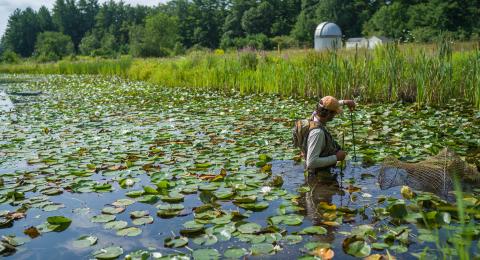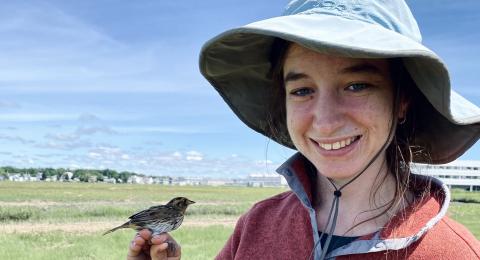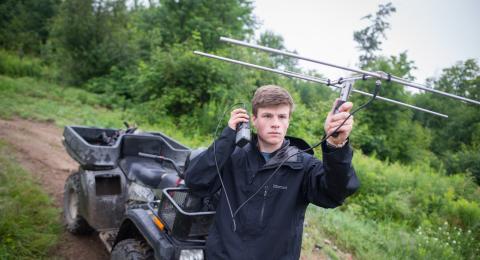Why get a master’s degree in natural resources with a wildlife and conservation biology option?
Climate and human land-use practices are continuously affecting wildlife species. If you’re passionate about the conservation of wildlife and its habitat, then a natural resources M.S. with the wildlife and conservation biology option may be for you. In this graduate program, you’ll take an integrated field-laboratory approach to the study of population ecology and conservation, community and landscape ecology, conservation genetics, and applied wildlife management. You’ll develop skills in inventory and monitoring, data analysis,and science communication that prepare you for work in a variety of government agencies, private conservation organizations, and academic positions in the United States and internationally.
Why choose UNH for your degree?
You’ll be supported by a productive and internationally recognized faculty, as well as outstanding laboratory facilities, as you advance toward either a professional career in wildlife and biology conservation or doctoral studies. Our main campus is located near the White Mountains and the Atlantic Ocean with access to a diverse array of terrestrial, marine and freshwater field sites. UNH also is ranked among the nation’s highest-performing research universities, having earned a Carnegie Classification R1. The university’s research portfolio brings in more than $110 million in competitive external funding each year.
Potential career areas
- Academia
- Environmental consulting
- Environmental education/extension
- Federal/state government agencies
- Land stewardship
- Nongovernmental conservation organizations
- Wildlife/natural resource management
Curriculum & Requirements
NATURAL RESOURCES: WILDLIFE AND CONSERVATION BIOLOGY
The MS option in Wildlife and Conservation Biology is typically pursued by those with a BS in Wildlife, Biology, Zoology, Environmental Studies, or related field. Research often takes an integrated field-laboratory approach to study population ecology and conservation, community and landscape ecology, conservation biology and genetics, and applied wildlife management issues.
Degree Requirements
An M.S. degree is conferred upon successful completion of a program of not less than 30 credits for natural resources and the environment options: forestry, environmental conservation and sustainability, environmental economics, ecosystem science, and wildlife and conservation biology.
Course Requirements or Equivalents
| Code | Title | Credits |
|---|---|---|
| NR 903 | Approach to Research | 2 |
| NR 905 | Grant Writing 2 | 2-3 |
| or BIOL 902 | Writing and Publishing Science | |
| or BIOL 950 | Scientific Communication | |
| or GRAD 834 | Fundamentals of Citizen and Community Science | |
| NR 993 | Natural and Environmental Resources Seminar | 2 |
| NR 996 | Natural Resource Education 1 | 2 |
| or NR 900 | Teaching Assistantship Practicum | |
| Select one of the following Data Analysis courses: 2 | 3-4 | |
ANFS 933 | Design, Analysis, and Interpretation of Experiments | |
BIOL 811 | Experimental Design & Analysis | |
DATA 800 | Introduction to Applied Analytic Statistics | |
ECON 926 | Econometrics I | |
EDUC 904 | Qualitative Inquiry in Research | |
ESCI 801 | Quantitative Methods in Earth Sciences | |
MATH 835 | Statistical Methods for Research | |
MATH 839 | Applied Regression Analysis | |
MATH 840 | Design of Experiments I | |
NR 909 | Analysis of Ecological Communities and Complex Data | |
NR 913 | Hierarchical Modeling in Ecology | |
PPOL 908 | Quantitative Methods for Policy Research | |
PSYC 805 | Research Methodology and Statistics I | |
PSYC 907 | Research Methods and Statistics III | |
SOC 901 | Sociological Methods I: Intermediate Social Statistics | |
SOC 903 | Sociological Methods III: Advanced Social Statistics | |
| Select one of the following: | 4-6 | |
NR 899 | Master's Thesis (6-credits) 3 | |
NR 998 | Directed Research (4-credits) 4 | |
- 1
If you are supported on a Teaching Assistantship, you are required to take NR 900 Teaching Assistantship Practicum, during your first semester.
- 2
Or other alternative with approval from the Graduate Coordinator.
- 3
The thesis option will provide a research-based thesis that is the foundation for a peer-reviewed publication.
- 4
The directed research option is a professionally oriented body of work, most often geared to meet the needs of the stakeholder. The project, designed and conducted by the student, will culminate in a scholarly paper or report that is suitable for publication in the respective field of scholarship.
An approved program of study plan is required during the first semester.
Accelerated Master's Overview
Accelerated Master’s programs offer qualified University of New Hampshire undergraduate students the opportunity to begin graduate coursework in select graduate programs while completing a bachelor’s degree. Accelerated master's programs are designed to provide students with an efficient and cost-effective pathway to earn both a bachelor's and master's degree or graduate certificate, enhancing career opportunities and long-term earning potential.
Accelerated Master's Highlights
- Begin studying advanced topics while an undergraduate student with the opportunity to complete a master’s degree or graduate certificate early.
- Master’s degree program students: Earn up to 12* graduate (800-level) course credits while completing a bachelor’s degree. This coursework will count as dual-credit toward both the bachelor’s and master’s degrees.
- Graduate certificate program students: Earn up to 8* graduate (800-level) course credits while completing a bachelor’s degree. This coursework will count as dual-credit toward both the bachelor’s degree and the graduate certificate.
- Students complete the bachelor’s degree, and then officially matriculate into the master’s or graduate certificate program to complete the remaining required graduate-level coursework.
*Some exceptions apply.
Accelerated Master's Admission Requirements
- A minimum 3.2 cumulative GPA is required.*
- A minimum of 90 undergraduate credits must be completed prior to enrolling in graduate (800-level) courses.
- Streamlined Graduate School Application (two letters of recommendation; most standardized tests and application fee are waived).*
*Some exceptions apply.
Accelerated Master's Requirements
- Students must attend a mandatory orientation session.
- Students must submit a special registration form each semester for dual-credit courses and note any DegreeWorks exceptions.
- Students may defer graduate matriculation for up to one year after earning their bachelor’s degree in most programs.
- See the Accelerated Master’s Catalog Policy and Accelerated Master’s Website for additional information and a list of programs. Note that some programs have additional requirements (e.g. higher-grade expectations) compared to the general policy.
Natural Resources: Wildlife and Conservation Biology (M.S.) Accelerated Option
This graduate degree program is approved to be taken on an accelerated basis in articulation with the following undergraduate program(s):
| Code | Title | Credits |
|---|---|---|
| Community and Environmental Planning (B.S.) | ||
| Environmental Conservation and Sustainability (B.S.) | ||
| Environmental and Resource Economics (B.S.) | ||
| Environmental Sciences: Soil and Watersheds (B.S.) | ||
| Environmental Sciences: Ecosystems (B.S.) | ||
| Forestry (B.S.F.) | ||
| Wildlife and Conservation Biology (B.S.) | ||
| Students select from the following approved 800-level courses that can be completed in the undergraduate senior year for dual credit: | ||
| BIOL 820 | Plant-Animal Interactions | 4 |
| ESCI 805 | Principles of Hydrology | 4 |
| ESCI 810 | Groundwater Hydrology | 4 |
| ESCI 847 | Aqueous Geochemistry | 4 |
| ESCI 877 | GIS for Earth & Environmental Sciences | 4 |
| ESCI 878 | Remote Sensing Earth & Environmental Sciences | 4 |
| NR 803 | Watershed Water Quality Management | 4 |
| NR 806 | Soil Ecology | 4 |
| NR 807 | Environmental Modeling | 4 |
| NR 820 | International Environmental Politics and Policies for the 21st Century | 4 |
| NR 824 | Resolving Environmental Conflicts | 4 |
| NR 829 | Silviculture | 4 |
| NR 830 | Terrestrial Ecosystems | 4 |
| NR 834 | Tropical Ecology | 4 |
| NR 840 | Inventory and Monitoring of Ecological Communities | 4 |
| NR 843 | Addressing Arctic Challenges I | 4 |
| NR 844 | Biogeochemistry | 4 |
| NR 845 | Forest Management | 4 |
| NR 849 | Forest Inventory and Modeling | 4 |
| NR 851 | Aquatic Ecosystems | 4 |
| NR 857 | Remote Sensing of the Environment | 4 |
| NR 859 | Digital Image Processing for Natural Resources | 4 |
| NR 860 | Geographic Information Systems in Natural Resources | 4 |
| NR 861 | Environmental Soil Chemistry | 4 |
| NR 882 | Forest Health | 4 |
| NR 887 | Advanced Topics in Sustainable Energy | 4 |
| RECO 856 | Rural and Regional Economic Development | 4 |
| RMP 811 | Recreation Resource Management | 3 |
Program Learning Outcomes
Key Learning Objectives
- Knowledge and skills outcomes to ensure graduates of the MS program have mastered their discipline: demonstrate knowledge of theory and practice, as well as critical thinking skills and creativity, in conducting ecological, economic, and policy assessment of natural resource and environmental issues and developing solutions to environmental problems;
- successfully employ the field, laboratory, data analysis, and social science skills necessary to perform research concerning natural resources and their management;
- design, propose, and execute research addressing fundamental or critical issues in natural resources;
- contribute to scholarship through publication and presentation of research findings using diverse media.
Professional outcomes to ensure graduates of the MS program successfully compete for jobs in the public and private sectors:
- demonstrate mastery of theory and empirical knowledge in their research concentration and, more generally, in the relevant natural and/or social;
- use written and oral skills to communicate effectively with colleagues, stakeholders, and the public;
- integrate theory and practice to analyze, assess, and solve environmental and social problems and answer questions across diverse scales from local to global;
- develop and employ interdisciplinary relationships and approaches to addressing environmental issues;
- interact with professional peers honestly and ethically, and in ways that show cultural sensitivity, inquisitiveness, and propensity for teamwork.
Deadline
Applications must be completed by the following deadlines in order to be reviewed for admission:
- Fall: February 15
- Spring: December 1
- Summer: N/A
- Special: N/A
Application fee: $65
Campus: Durham
New England Regional: MA
Accelerated Masters: Yes (for more details see the accelerated masters information page)
New Hampshire Residents
Students claiming in-state residency must also submit a Proof of Residence Form. This form is not required to complete your application, but you will need to submit it after you are offered admission, or you will not be able to register for classes.
Transcripts
If you attended UNH or Granite State College (GSC) after September 1, 1991, and have indicated so on your online application, we will retrieve your transcript internally; this includes UNH-Durham, UNH-Manchester, UNH Non-Degree work and GSC.
If you did not attend UNH, or attended prior to September 1, 1991, then you must upload a copy (PDF) of your transcript in the application form. International transcripts must be translated into English.
If admitted, you must then request an official transcript be sent directly to our office from the Registrar's Office of each college/university attended. We accept transcripts both electronically and in hard copy:
- Electronic Transcripts: Please have your institution send the transcript directly to grad.school@unh.edu. Please note that we can only accept copies sent directly from the institution.
- Paper Transcripts: Please send hard copies of transcripts to: UNH Graduate School, Thompson Hall- 105 Main Street, Durham, NH 03824. You may request transcripts be sent to us directly from the institution or you may send them yourself as long as they remain sealed in the original university envelope.
Transcripts from all previous post-secondary institutions must be submitted and applicants must disclose any previous academic or disciplinary sanctions that resulted in their temporary or permanent separation from a previous post-secondary institution. If it is found that previous academic or disciplinary separations were not disclosed, applicants may face denial and admitted students may face dismissal from their academic program.
Letters of recommendation: 3 required
Recommendation letters submitted by relatives or friends, as well as letters older than one year, will not be accepted.
Personal Statement/Essay Questions
Prepare a brief but careful statement regarding:
- Reasons you wish to do graduate work in this field, including your immediate and long-range objectives.
- Your specific research or professional interest and experiences in this field.
Important Notes
All applicants are encouraged to contact programs directly to discuss program-specific application questions.
Applicants should visit the Natural Resources program website and review the list of faculty in their area of interest. The applicant should contact potential faculty advisors to discuss their interests and determine whether the faculty member(s) may be willing and able to serve as the student’s advisor before applying to the program. See the Natural Resources Faculty List for a current list of faculty.
GRE Optional
The GRE scores are optional, if you wish to provide scores please email the scores directly to the department once you have submitted your application online.
International Applicants
Prospective international students are required to submit TOEFL, IELTS, or equivalent examination scores. English Language Exams may be waived if English is your first language. If you wish to request a waiver, then please visit our Test Scores webpage for more information.















